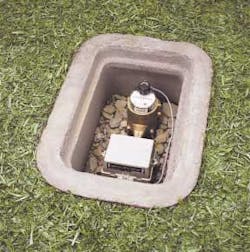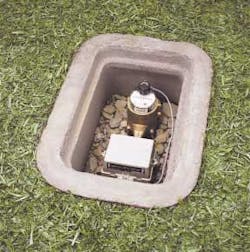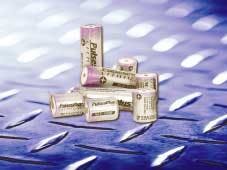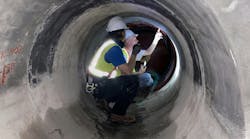By Thomas Galuska
As the water utility industry continues to migrate toward widescale use of Automatic Meter Reading (AMR) technology, the industry faces an ongoing challenge to make these installations increasingly profitable by extending the time between battery change outs.
With a current installed base of approximately 11.3 million units, the North American water utility AMR market is expected to grow by at least 20% over the next year, fueled by an ongoing demand to reduce labor costs associated with manual meter reading.
To realize such aggressive growth projections, AMR device manufacturers must continue to demonstrate to water utility customers that the initial investment costs associated with an AMR system installation can be cost justified by long-term savings. Issues related to long-term maintenance, including the costs associated with replacing batteries on a system-wide basis, factor heavily into this equation.
Self-Contained Power
In most cases, water utilities have limited options in terms of powering their AMR devices, with self-contained battery powered solutions being the preferred choice. Among primary battery alternatives, lithium thionyl chloride chemistry offers unique advantages to AMR applications, due to inherent advantages such as higher energy density, higher capacity, extended temperature range, and a service life that can exceed 20 years.
AMR meter design technology is rapidly evolving, with systems becoming increasingly feature-rich and power hungry. This trend, in turn, has pushed traditional lithium battery technology to its limits. Utility customers are increasingly demanding long-life batteries, recognizing that system-wide battery failures can lead to disrupted billing and costly service calls. This problem can be magnified by the fact that newer AMR devices often generate high current surges at periodic intervals, with little or no background current between signal transmission.
These high current pulse requirements have led to the development of a new hybrid lithium thionyl chloride battery technology, in which standard bobbin-type construction is combined with a unique Hybrid Layer Capacitor (HLC) to accommodate high current surges.
Chemistry
Lithium thionyl chloride cells feature the highest energy density and the highest open circuit voltage (3.6V) of any battery type. While the theoretical service life of a lithium thionyl chloride cell can exceed 20 years, the actual service life varies depending upon how the battery is manufactured. The service life of the battery is based largely on its self-discharge rate; which is governed by the cell's electrolyte composition, the production processes used in its manufacture, as well as mechanical and environmental considerations.
For example, a typical bobbin-type lithium thionyl chloride cell will deliver significantly lower self-discharge than a spiral wound lithium thionyl chloride cell of equal size. Self-discharge rate can be negatively impacted by high levels of impurities in the electrolyte. Extreme temperatures can also reduce battery performance, affecting both the voltage and self-discharge rate of the battery. As with all lithium chemistries, lithium thionyl chloride chemistry is non-aqueous, enabling these cells to withstand extreme temperatures, as low as -55∞C and as high as +150∞C in some cases.
Battery performance is also affected by impedance, resulting from the internal resistance developed by the electrolyte, the anode, and the cathode. Impedance levels can rise due to certain high current surges, measurable through a reduction in load voltage. Experienced battery manufacturers have developed effective methods for controlling impedance by blending special additives into the electrolyte.
AMR Applications
Lithium thionyl chloride batteries are commonly found in a variety of AMR applications, including flow meters, tank level monitors and other related devices. One recent example involves Sensus Metering System's MXU 505C meter transceiver unit.
Designed to work with the RadioRead™ system, a complete package of AMR applications, the MXU 505C meter transceiver unit connects to water meters located in basements, underground pits, and on the outside walls of buildings. The transceiver features two-way communications with the company's hand-held or vehicle-based meter reading interrogators using Direct Sequencing Spread Spectrum (DSSS) technology.
Technical Considerations
Designing an AMR device with a 20-year service life involves numerous technical challenges. After evaluating its battery chemistry alternatives, Sensus Metering Systems chose a hybrid lithium thionyl chloride battery, combining a Tadiran PulsePlus™ bobbin-type lithium thionyl chloride C-size cell with a unique Hybrid Layer Capacitor (HLC). The PulsePlus' cell features high energy density, high capacity, and the lowest self-discharge of any lithium chemistry, enabling the MXU 505C to maximize data streams without sacrificing battery life. Use of the hybrid battery pack also permitted Sensus to offer the industry's first nationally published 20-year warranty for both system electronics and battery.
For more information on the RadioRead MXU 505C meter transceiver unit, visit the Sensus Metering Systems Web site at www.sensus.com.
About the Author:
Thomas Galuska is the AMR Marketing Manager for Sensus Metering Systems. He is a former member of the Board of Trustees for AMRA and has over 13 years experience in utility and AMR markets. Galuska holds a BSBA and an MBA from Robert Morris University. He can be reached at (724) 425-7600 or by e-mail at [email protected]





